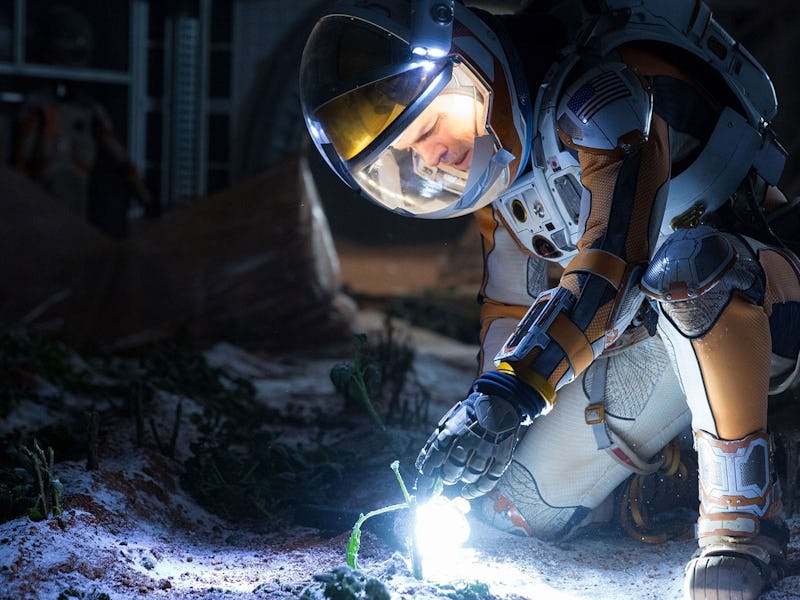'The Martian' Is a Powerful Infomercial for Science and for NASA
Ridley Scott's sci-fi epic goes big on mankind's future in space.

When the trailer debuted for Ridley Scott’s imminent Robinson Crusoe-by-way-of-the-red-planet movie, The Martian, it seemed to give away the entire movie. Matt Damon’s astronaut character, Mark Watney, gets stranded by his crew, he has to do some science to stay alive, a rescue mission is sent to save him, roll credits. While the trailer, in fact, gives a lot of the plot away for those of us who haven’t read the source material by author Andy Weir, there isn’t necessarily anything wrong with that. Anybody with a lick of sense can see there are some serious Castaway mixed with Apollo 13 mixed with Gravity vibes at work here; the math isn’t hard to do. But thankfully the rest of The Martian is filled with scenes of survival tactics that amount to a NASA nerd’s dehydrated wet dream.
Sci-fi revels in dystopian futures that tacitly blame scientific advances for driving us into a ditch. The Martian, by contrast, builds a near future (maybe 25 years away) in which science has helped people push past the petty bullshit and arrive at maybe the most harmonious global future we can realistically expect.
Watney embodies this optimistic pragmatism. The botanist-astronaut is left behind when a five-person mission to Mars encounters disaster; figuring Watney for dead, the rest of his crew leaves him at the landing site, near a shelter, the “habitat,” that was meant to be only temporary. He’s left to figure out how to sustain himself, presumably for years. When he proclaims, “I’m going to science the shit out of this,” it recalls the way Scarlett O’Hara announced she’d never be hungry again. When Watney is stranded on the desolate red planet, with his crew thousands of miles away and his home planet even further out of reach, his best hope isn’t his strength or his environment. His best weapon is his intellect.
Survival stories have been around since forever, but the genius of Scott’s movie is pitching the man-vs.-nature scenario into a future we can see coming. The Martian sees a resurgent NASA regularly sending manned missions to Mars and beyond. The science-first approach never becomes didactic. But the optimistic benefits of science and progress undergird Damon and the rest of the cast — Jessica Chastain, notably — to play out the drama.
And The Martian definitely isn’t short on drama. Watney’s isolation and the rescue effort are spectacle writ large: This is, after all, the same Scott who directed Gladiator, Exodus: Gods and Kings, and Kingdom of Heaven. Yet Mars’ wide expanses always shrink back down to small scale problem-solving. Watney must figure out: How will he grow food? How will he produce water? How will he heat the habitat? How will he communicate with NASA? How will he survive?
These questions come down to Watney’s pluck and toughness. Dude has to figure out how to grow Earth crops in an alien soil. He has to engineer video chat out of decrepit hardware. Damon is probably the only actor in Hollywood who can make science seem this cool without it turning into lecture hall.
It amounts to a valentine to NASA and other space exploration agencies. Instead of relying on purple melodrama to provide the story beats, we’re given near-true-to-life situations in which the Jet Propulsion Lab or the CNSA come to the rescue. The drama doesn’t feel manufactured when the logic seems this rigorous.
Space is vast, complex, and cold. It will put people in life-altering situations so long as we assume the risks of blazing trails across the solar system. But The Martian posits human space travel is, after all, totally worth it. Life and death in The Martian hinge on knowledge more than on pure guts. The future, it says, will be determined by our bravery, but more so, our willingness to science the shit out of the world today.